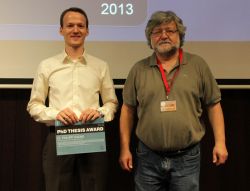
On 19 December 2014, theoretical physicist Philipp Hauke, a member of Peter Zoller’s research group, received the ICFO PhD Thesis Award for his dissertation on quantum simulation with ultracold atoms. His thesis has contributed to expanding the theoretical foundation of quantum simulation.
In Barcelona, Philipp Hauke received the ICFO PhD Thesis Award for his dissertation “Quantum simulation with ultracold atoms: Beyond conventional optical lattices“, which he defended at the ICFO-The Institute of Photonic Sciences and Barcelona Tech last year. Since October 2012 Philipp Hauke has worked as junior scientist in Peter Zoller’s theory group Quantum Optics and Quantum Information at the Institute for Quantum Optics and Quantum Information (IQOQI). The two other ICFO PhD Thesis Award winners are Marc Jofre (applied research) and Alberto G. Curto (experimental research).
New applications for quantum simulation
In the award-winning thesis, Philipp Hauke discussed the general issue of the reliability of the results achieved by realistic error-prone quantum simulation. In addition, he explored possibilities to expand the catalogue of quantum problems that can be simulated by including non-standardized setups. Philipp Hauke showed how the use of exotic lattice geometries, higher orbitals, or spin-dependent optical lattices may enable the simulation of a variety of interesting phenomena in solid body physics. These include magnetic quantum phase transitions, pair superfluidity, supersolidity and states that violate time-reversal invariance. Moreover, through time-periodic driving of optical lattices frustrated antiferromagnets, synthetic gauge fields, topological insulators and anomalous quantum Hall effects may be simulated. Some of the examples have already been realized in experiments. “We hope that it won’t take too long that these exciting technological developments will allow us to gather deep insights into some of the major problems of condensed-matter and high-energy physics,” says award winner Philipp Hauke.